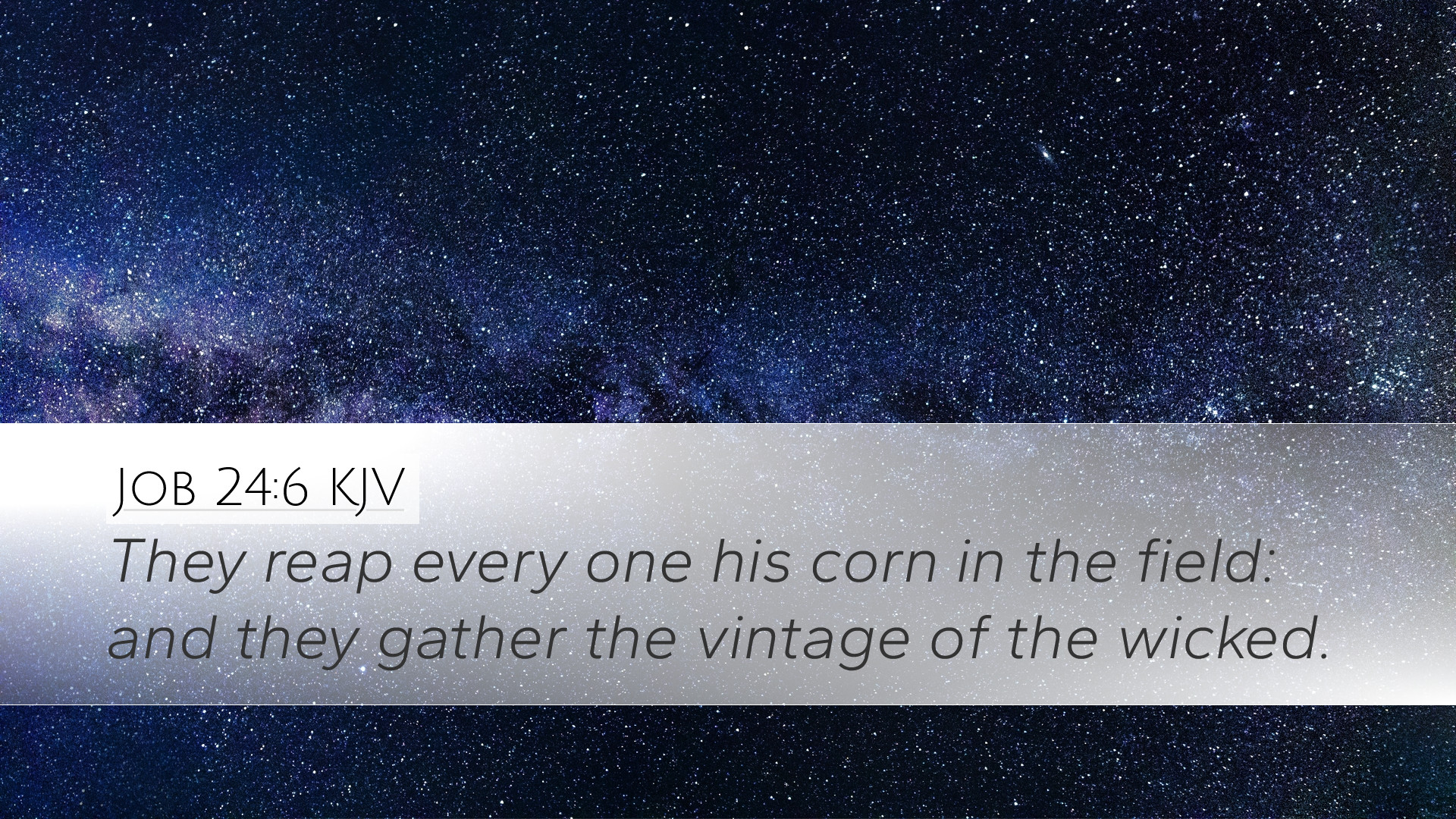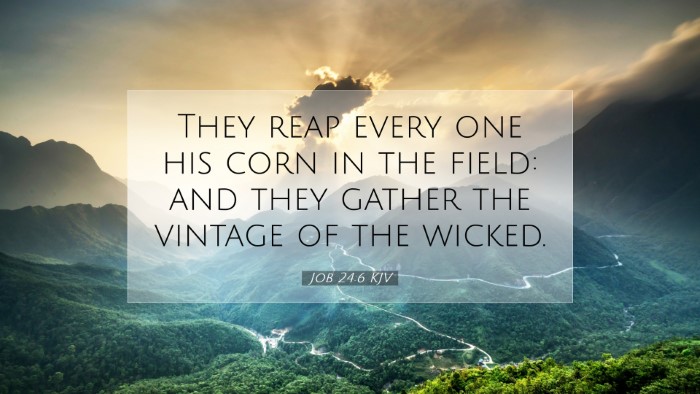Old Testament
Genesis Exodus Leviticus Numbers Deuteronomy Joshua Judges Ruth 1 Samuel 2 Samuel 1 Kings 2 Kings 1 Chronicles 2 Chronicles Ezra Nehemiah Esther Job Psalms Proverbs Ecclesiastes Song of Solomon Isaiah Jeremiah Lamentations Ezekiel Daniel Hosea Joel Amos Obadiah Jonah Micah Nahum Habakkuk Zephaniah Haggai Zechariah MalachiJob 24:6
Job 24:6 KJV
They reap every one his corn in the field: and they gather the vintage of the wicked.
Job 24:6 Bible Commentary
Commentary on Job 24:6
Verse: "They reap every one his corn in the field, and they gather the vintage of the wicked." (Job 24:6)
Introduction
The verse under consideration, Job 24:6, highlights a profound ethical and moral dilemma that permeates the Biblical text: the apparent prosperity of the wicked and their thriving despite the righteous suffering. This commentary draws insights from esteemed public domain commentaries, including those of Matthew Henry, Albert Barnes, and Adam Clarke.
Contextual Analysis
Job 24 is part of a larger discourse in which Job reflects on the injustices of life. His assertions seek to articulate the disparity between the righteous and the wicked as they exist within God’s created order.
- The Moral Order: Job confronts the question of why the wicked appear to prosper. This question is echoed throughout the Scriptures and poses a critical challenge to the doctrine of retribution.
- Job's Suffering: Job’s own suffering casts a long shadow over his reflections. He is not merely speaking in abstract terms but is acutely aware of his own plight as he observes the injustices at work in his society.
Exegesis of Job 24:6
Harvesting in the Field: The phrase “reap every one his corn in the field” emphasizes the agricultural practices of ancient Israel. The imagery conveys that the wicked, through their schemes or dishonest practices, partake in the bounty of the earth.
Gathering the Vintage: The "vintage of the wicked" adds another layer to this observation. The term “vintage” evokes not just the act of gathering grapes, but it also speaks to the fruits of their malevolent labor. This suggests an opportunistic exploitation of both the land and the labor force.
Matthew Henry's Insights
Matthew Henry delves into the moral ramifications of this verse. He elucidates that Job laments the fact that the wicked seem to reap what they have not sown, drawing attention to the injustice of their flourishing lives. Henry suggests that the allusions to "corn" and "vintage" represent the fruits of hard work that should be reserved for the righteous.
- Moral Inversion: Henry remarks that Job is confronting a moral inversion where the wicked are unjustly rewarded while the righteous suffer.
- Divine Justice: Ultimately, Henry argues that although the wicked may seem to prosper now, divine justice will prevail, reinforcing the need for patience and faith in God's ultimate plan.
Albert Barnes' Perspective
Albert Barnes puts forth that Job’s view reflects the harsh realities of life’s inequities. He emphasizes the fact that the verse captures the essence of social injustice, where the wicked audaciously enjoy the fruits of their labor despite their moral corruption.
- Suffering of the Righteous: Barnes poignantly analyzes that the suffering of the righteous juxtaposed against the prosperity of the wicked is a thematic underpinning of the book of Job.
- Call to Reflection: He calls the readers to reflect on their own lives and the lives around them, encouraging a deeper understanding of justice beyond immediate appearances.
Adam Clarke's Interpretation
Adam Clarke provides a detailed breakdown of the agricultural nuances presented in the text. He notes that harvesting represents not just a physical act but also symbolizes the reaping of benefits derived from dubious moral practices.
- Implication of Labor: Clarke emphasizes that their labor is morally tainted, challenging the idea that hard work and success always align with righteousness.
- Human Experience: Clarke’s analysis touches on the broader human experience, asserting that believers must grapple with these paradoxes in their own faith journeys.
Theological Implications
Job 24:6 invites profound theological reflection on divine justice, human suffering, and the nature of prosperity. It ultimately leads to considerations of God's sovereignty and the mystery of His providential governance.
- The Nature of God: Does God's apparent silence in the face of wickedness imply His absence or indifference? The question challenges believers to maintain faith even when circumstances suggest otherwise.
- Hope in Justice: The tension present in this verse serves to underscore a broader biblical narrative that culminates in God’s ultimate justice, as seen throughout Scripture.
Conclusion
Job 24:6 stands as a poignant reminder of the complexities of human existence and divine oversight. Biblical commentators such as Matthew Henry, Albert Barnes, and Adam Clarke provide valuable insights that not only elucidate the text but also encourage pastors, students, theologians, and scholars to engage deeply with the text. This engagement can yield richer understandings of justice, affliction, and the enduring hope that lies in God’s ultimate plan.


